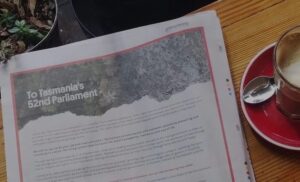Share
The Australian native forest sector has been in decline for the past two decades and all but fallen off a cliff since the onset of the global financial crisis in late 2008. The forestry lobby has tried to lay the lion’s share of the blame for its predicament at the feet of the environmental movement, claiming that increases in forest reserves and campaigning in Japan have restricted its access to logs and stifled demand. But the problem with the tale spun by the industry is that it requires the suspension of reality. Basic economic principles suggest that when the supply of a product is restricted, its price will rise. This was vividly illustrated in the aftermath of Cyclone Larry and Cyclone Yasi in 2006 and 2011. Both cyclones caused extensive damage to banana plantations in Queensland, triggering sharp increases in banana prices. In contrast to this standard market response, the restrictions imposed on the Australian native forestry sector since the mid-1990s have not resulted in an increase in the price of native hardwood products.
Related documents
Between the Lines Newsletter
The biggest stories and the best analysis from the team at the Australia Institute, delivered to your inbox every fortnight.
You might also like
Open Letter to the Tasmanian Government
The Australia Institute and 30 other organisations from around Tasmania have published an open letter with 10 asks for the environment from whomever forms Tasmania’s next government. When cross-benchers and major parties have struck successful power-sharing agreements elsewhere, they covered policy as well as procedure, making now the ideal time for progress.
One year on from the State of the Environment Report, what’s changed?
(Spoiler alert: nothing!)
Federal reform to GST would deliver significant revenue to Tasmania and other states
Australia Institute research shows simple reforms to the GST would deliver a much-needed budget boost to Tasmania.



